 | 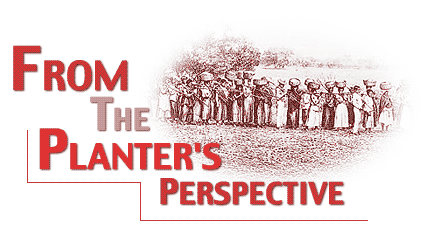
 |
The English colonists who settled in the West Indies developed laws that institutionalized an early warning system against slave revolts. These early Caribbean planters were among the first Europeans in the New World to erect such a comprehensive slave code. This code developed into the basic social and economic law of the islands. In effect, the slave laws legitimized a state of war between blacks and whites; one fought for hundreds of years on multiple continents. The Caribbean slave laws of Barbados, Jamaica, and the Leeward Islands became the stepping stone for the institutionalization of slavery, not only in the Western Hemisphere, but throughout the world. European planters in these islands developed a number of ways to suppress and punish any form of slave misconduct or insurrection.
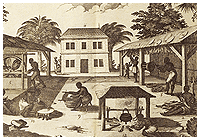
The influx of enslaved Africans to the New World led to the development of "acts for governing the Negroes." These slave laws enacted by the island legislatures tell us a good deal about the treatment of these enslaved Africans and the institution of slavery in the Caribbean colonies. Of course, these laws set formal standards that were not necessarily followed. The planters practiced an infinite number of inhumane and illegal actions to suppress resistance and "domesticate" the enslaved Africans. But legal backing sanctified many such customs: a majority of the Civil laws and Codes, passed by the planters, called for the physical punishment of slaves.
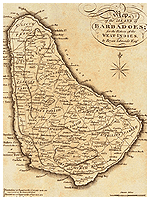 In Barbados, the planters passed harsh laws that allowed them to beat slaves found guilty of crimes. If, while beating a slave, a slave owner happened to maim or kill the slave, the slave owner would suffer no penalty. For offenses such as stealing or the destruction of goods, the slave, if convicted and found guilty, was to "be publicly and feverely whipped, not exceeding Forty Lafhes." If the slave repeated the said offense they could have "his or their Nofes flit, and be branded in the forehead with a hot Iron, that the mark thereof may remain." If the slave was found guilty a third time "then such Negroe or other slave for that Third Offense, fhall be adjudged and fuffer Death." In Barbados, the planters passed harsh laws that allowed them to beat slaves found guilty of crimes. If, while beating a slave, a slave owner happened to maim or kill the slave, the slave owner would suffer no penalty. For offenses such as stealing or the destruction of goods, the slave, if convicted and found guilty, was to "be publicly and feverely whipped, not exceeding Forty Lafhes." If the slave repeated the said offense they could have "his or their Nofes flit, and be branded in the forehead with a hot Iron, that the mark thereof may remain." If the slave was found guilty a third time "then such Negroe or other slave for that Third Offense, fhall be adjudged and fuffer Death."
Laws passed to protect the planter population from the constant threat of slave revolt, called for planters to keep the slave cabins under close surveillance. The planters strictly prohibited slave possession of arms, guns, or any form of offensive weaponry. And they dealt with mutiny, insurrection, or revolt even more severely:
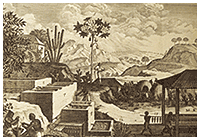
"preparation of Arms, Powder, Bullets, or Offenfive weapons, or hold any Council or Confpiracy of, or raifing Mutiny or Rebellion againft this Island--Concealers of fuch a Mutiny or Rebellion, and them punifh by Death or other Pains as their crimes fhall deserve".
Slave codes varied from island to island. In 1696, Jamaica passed a comprehensive slave code. Unlike Barbados, Jamaica was always short of slaves in the seventeenth century. Thus, they were reluctant to execute too many enslaved Africans. Nonetheless, the punishments that the laws imposed for certain violent acts were still cruel by any standards, and built a barrier of terror against slave resistance: "--when ever a Negroe gang committed a crime fhort of murder, only one member of the group fhould be executed af an example to the reft."
 Laws strictly and severely punished runaway slaves. "-- If a planter had a Negroe who was always running away, he is allowed to fit him with an iron yoke that had three long hooks projecting from it to hinder his future efcapes." Such laws were particularly important on Jamaica, largest of the British West Indies, and an island where the Maroons in the Blue Mountains offered a real alternative to the plantation. The Jamaican planter needed these comprehensive slave codes to instill fear in the minds of the slaves and keep them from running away. Fear was the driving force in the planter's daily ag Laws strictly and severely punished runaway slaves. "-- If a planter had a Negroe who was always running away, he is allowed to fit him with an iron yoke that had three long hooks projecting from it to hinder his future efcapes." Such laws were particularly important on Jamaica, largest of the British West Indies, and an island where the Maroons in the Blue Mountains offered a real alternative to the plantation. The Jamaican planter needed these comprehensive slave codes to instill fear in the minds of the slaves and keep them from running away. Fear was the driving force in the planter's daily ag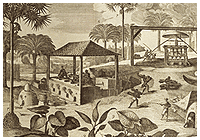 enda. enda.
The slaves of the British Leeward Islands enjoyed slightly greater freedom than their Barbados and Jamaican counterparts, but endured the same cruel punishments. On Antigua and Monserrat slaves were customarily severely whipped rather than killed for stealing or wounding livestock. But here brutality simply took a different form. Planters were expected, by law, to plant an acre of provisions for every eight slaves. However, the food rations were often minuscule and insufficient. Some slaves were forced to hide meat in their cabins. If the planter discovered that the slave was stealing food rations, "he is directed to cut off the culprits ear!"
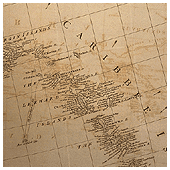 The planters had a shared view about what ideas, interests, institutions, and freedoms insured their own welfare. Their position on slavery promoted malicious acts against the slaves, and punishment for enslaved Africans who resisted the plantation’s heavy yoke was swift. Brutal and unmerciful consequences fell on slaves who broke the law. These slave laws played an important role in the history of slavery, and have their echoes even today. Areas once dominated by slavery in the New World continue to exact harsher punishments for crimes real or imagined than those once based on free labor. And the descendants of enslaved Africans continue to bear the disproportionate brunt of such punishments, and to serve for many racially obsessed whites as symbols of crime. Founded upon principles of injustice and inequality, the slave codes and laws are a part of the history of slavery not easily forgotten by any society or culture. The planters had a shared view about what ideas, interests, institutions, and freedoms insured their own welfare. Their position on slavery promoted malicious acts against the slaves, and punishment for enslaved Africans who resisted the plantation’s heavy yoke was swift. Brutal and unmerciful consequences fell on slaves who broke the law. These slave laws played an important role in the history of slavery, and have their echoes even today. Areas once dominated by slavery in the New World continue to exact harsher punishments for crimes real or imagined than those once based on free labor. And the descendants of enslaved Africans continue to bear the disproportionate brunt of such punishments, and to serve for many racially obsessed whites as symbols of crime. Founded upon principles of injustice and inequality, the slave codes and laws are a part of the history of slavery not easily forgotten by any society or culture.
|
Hall Esq., Richard. Acts passed in the Island of Barbados. London. 1764.
Laws of Barbados (1688)
Jamaican Slave Laws of 1664
Nevis Act, Leeward Islands Laws, 1668-1682 |

 |





